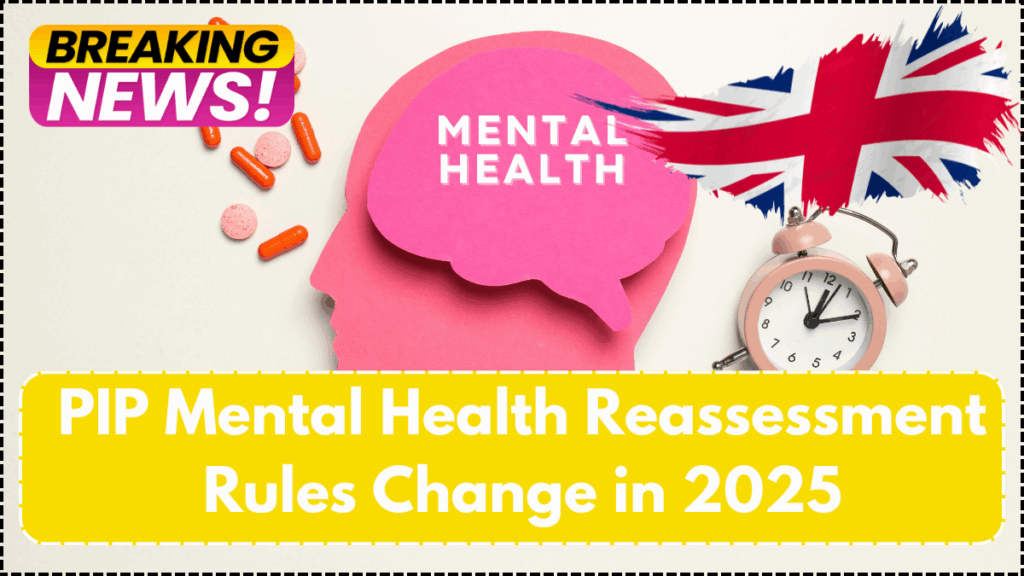Starting from June 2025, the UK government is introducing new PIP reassessment rules for mental health 2025, marking a pivotal change in how individuals with mental health conditions are evaluated for Personal Independence Payment (PIP). The Department for Work and Pensions (DWP) aims to streamline the reassessment process to reduce stress and administrative burden on long-term mental health claimants.
This overhaul is expected to affect both current claimants and new applicants. The intent behind these changes is to create a more compassionate and consistent experience for those managing enduring mental health issues.

What’s Changing in the PIP Mental Health Reassessment Process?
The reassessment process is being redesigned to better align with the realities of long-term mental health conditions. In many cases, individuals have faced repeated assessments despite their condition being unlikely to improve. Under the 2025 rules, the frequency and nature of reassessments will shift as follows:
Category | Previous System | 2025 Changes |
|---|---|---|
Review Frequency | Every 2-3 years | Extended to 10 years (for stable conditions) |
Evidence Requirement | Fresh documentation for each review | Prior records used unless condition changes |
Face-to-Face Assessments | Often mandatory | Optional, especially for ongoing mental health |
Auto-Extension of Awards | Rare | Introduced for severe or lifelong conditions |
These changes recognize that conditions like bipolar disorder, PTSD, and chronic anxiety disorders often do not fluctuate significantly over short periods.
How the New Rules Improve PIP Mental Health Benefits Experience
The updated approach reflects a broader understanding of the chronic nature of mental health conditions. Instead of forcing vulnerable individuals to repeatedly prove their eligibility, the focus is shifting to trust, consistency, and efficiency. These reforms will improve the experience for those receiving PIP mental health benefits by:
- Reducing the frequency of stressful reassessments
- Allowing for more flexible evidence requirements
- Providing longer-term financial security
- Cutting down on unnecessary bureaucracy
Claimants with well-documented, stable mental health issues may receive extended awards without the need for constant medical reviews. This not only benefits individuals but also reduces strain on the healthcare and welfare systems.
Key Impacts of the PIP Assessment Changes in 2025
The PIP assessment changes arriving in June 2025 will directly impact thousands of claimants across the UK. Here’s what to expect:
- Automatic Reviews Postponed: If your condition hasn’t changed, your award may be renewed automatically.
- Reduced Medical Review Demand: Fewer requests for updated GP notes or mental health assessments unless there’s evidence of a change.
- Digital Options Expanded: Online reassessment tools and remote interviews will now be more widely used, improving accessibility.
These updates aim to ensure that those with genuine need are not trapped in a loop of revalidation.
Challenges and Considerations
While these updates are widely welcomed, some advocacy groups have raised concerns about how fairly the new system will be applied. There’s a need for clear criteria to determine who qualifies for extended or automatic reassessment exemptions. Additionally, transparency in decision-making will be crucial to prevent inconsistencies and disputes.
The DWP has stated that training assessors to better understand mental health conditions is part of this rollout, but close monitoring will be essential.
Conclusion: A More Compassionate System for 2025 and Beyond
The 2025 update to PIP reassessment rules for mental health is a significant step toward a more equitable system. By reducing unnecessary reassessments and embracing long-term support models, the government acknowledges the realities faced by mental health claimants. While implementation must be carefully monitored, this reform has the potential to ease pressure on some of the UK’s most vulnerable citizens.
FAQ
What are the new PIP reassessment rules for mental health 2025?
The new rules extend review periods up to 10 years for claimants with stable mental health conditions and reduce the need for repeat assessments.
Will I still need to attend face-to-face assessments?
Only if there’s a significant change in your condition. Many assessments will now be done remotely or waived entirely.
Do these changes apply to all PIP claimants?
The changes primarily target individuals with long-term mental health conditions, but some policies may extend to other disability categories over time.
What should I do to prepare for these changes?
Make sure your existing records are up to date and clearly reflect the nature and duration of your condition. No immediate action is required unless your review is due after June 2025.
Can I appeal if I feel my reassessment was unfair?
Yes. The standard appeal process remains available for anyone dissatisfied with the outcome of their PIP review.
Click here to learn more
